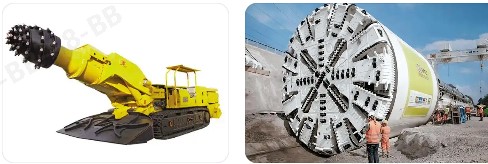What is the difference between TBM and Roadheader? The differences between Tunnel Boring Machines (TBMs) and Roadheaders can be categorized as follows:

1. Design and Operation:
- TBM: Features a full-face rotating cutterhead that excavates the entire tunnel diameter simultaneously. It is typically shielded and includes integrated systems for lining installation (e.g., segment erectors) and continuous muck removal via conveyors.
- Roadheader: Equipped with a boom-mounted cutting head (often a drum with picks) that excavates incrementally. The boom allows for flexibility in cutting direction and shape.
2. Tunnel Shape and Size:
- TBM: Excavates circular tunnels of consistent diameter, ideal for large-scale projects (e.g., subways, hydroelectric tunnels).
- Roadheader: Capable of creating non-circular profiles (e.g., rectangular, arched) and is used for smaller, variable tunnels or mine galleries.
3. Applications:
- TBM: Suited for long, straight tunnels in urban infrastructure or large transportation projects.
- Roadheader: Used in shorter tunnels, mining, or projects requiring complex geometries (e.g., junctions, cross-passages).
4. Flexibility:
- TBM: Limited to linear paths; difficult to redirect once launched.
- Roadheader: Highly maneuverable, with the ability to adjust direction and handle irregular layouts.
5. Ground Conditions:
- TBM: Handles a wide range of conditions (soft soil to hard rock) using specialized variants (e.g., EPB, Slurry, Hard Rock TBMs).
- Roadheader: Best in soft to medium-hard rock or coal; less effective in highly abrasive or unstable ground without additional support.
6. Speed and Efficiency:
- TBM: Faster for long, uniform tunnels due to continuous excavation and simultaneous lining.
- Roadheader: Slower but adaptable, ideal for projects requiring frequent changes in cross-section or alignment.
7. Cost and Logistics:
- TBM: High initial investment and setup costs, economical only for large, straight projects.
- Roadheader: Lower upfront costs, modular design, and easier transportation, suitable for smaller or variable projects.
8. Safety and Support:
- TBM: Shielded design protects workers and allows immediate ground support via pre-cast segments.
- Roadheader: May require manual installation of supports (e.g., rock bolts, shotcrete), exposing workers to unsupported ground temporarily.
Summary: TBMs excel in large, linear tunnels with consistent geology, offering speed and safety. Roadheaders provide versatility in shape and direction, making them ideal for smaller, complex, or mining-related projects. The choice depends on project scale, geology, and required tunnel geometry.




